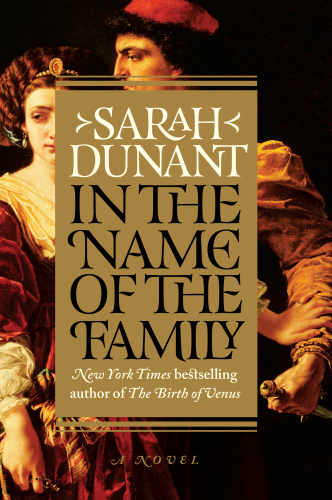
In the Name of the Family
A Novel
کتاب های مرتبط
- اطلاعات
- نقد و بررسی
- دیدگاه کاربران
نقد و بررسی

February 6, 2017
Renaissance doyenne Dunant (Blood and Beauty) turns her sights once again on the Borgia family. Pope Alexander VI is firmly entrenched in his powerful position, consumed with revenge against his enemies. His ambitious son, Cesare—with access to the church coffers—is spurred to take over more and more of Italy’s city-states, no matter the cost in money or lives, and his daughter, Lucrezia, a pawn in the power-hungry plans of her family, makes her own mark on 16th-century Italy. As the Borgia clan extends its reach, whether through bloody confrontations or cunning behind-the-scenes maneuvering, historian and diplomat Niccolò Machiavelli has a front-row seat for the various machinations, observing their stunning moves while advising his superiors in Florence how to deal with the changing political climes. Although the author occasionally gets caught up in some of the distracting internecine workings of factions against the pope (their opponents were many), Dunant is at her best focusing on the three Borgias, especially the conflicts between Cesare and his father as both gain in power and stature, and most particularly on the life of Lucrezia, forced into different marriages for political benefit, nearly dying from a debilitating flu, and finally coming to terms with the enigmatic Alfonso, son of the duke of Ferrara and her third husband, with whom she ensures the future of a powerful dynasty.

February 1, 2017
Another sojourn with the infamous Borgias from the author of Blood and Beauty (2013).Since the publication of The Birth of Venus (2003), Dunant has built a solid reputation as a practitioner of historical fiction who specializes in the Italian Renaissance. Even in a period with a surfeit of larger-than-life characters, Pope Alexander VI and his children, Lucrezia and Cesare, stand out, so it's no surprise that Dunant would revisit this family. Although the material is rich, this isn't the writer's best work. There are anachronisms--or, at the very least, moments that lift the reader right out of 16th-century Italy. For example, there's a "maverick winter snowfall" in the prologue. "Maverick" didn't become a word until the 19th century, and it is too connected--etymologically and symbolically--with the American West to feel natural in a passage written from the viewpoint of Niccolo Machiavelli. Later, one of Lucrezia's ladies compares a stoop-backed duke to a question mark. Whether a woman in this time and place would have even been capable of making this analogy is not a settled matter, but it seems unlikely, and, in any case, a storyteller does not want readers pausing to Google the history of punctuation in Italy. These might seem like small matters, but they make it hard to believe in the world Dunant has built. There are other issues endemic to historical fiction, like slightly overripe language and dialogue laden with information that everyone participating in the conversation would surely possess already. However, one of Dunant's great strengths as a writer is in illuminating the lives of women who were able to amass and wield power despite having no authority. Even during her lifetime, Lucrezia Borgia was turned into a monster by her family's enemies, and her name is still a byword for feminine villainy. In Dunant's hands, she is a whole person, and that alone might keep readers captivated. Flawed but not without interest--sort of like the Borgias themselves.
COPYRIGHT(2017) Kirkus Reviews, ALL RIGHTS RESERVED.

October 15, 2016
Renowned for her bright and disciplined way with Renaissance Italy, New York Times best-selling novelist Dunant again visits the Borgias, to whom she recently paid court in Blood and Beauty. As Cesare ruthlessly seeks to unite all of Italy's city-states under Borgia control, Florence counters by sending one Niccolo Machiavelli to Rome as envoy and Lucrezia learns the family business of big-stakes political maneuvering.
Copyright 2016 Library Journal, LLC Used with permission.

























دیدگاه کاربران